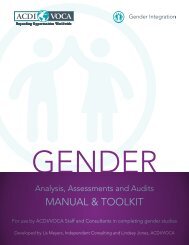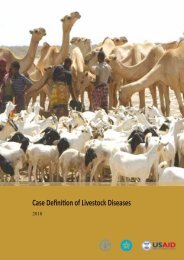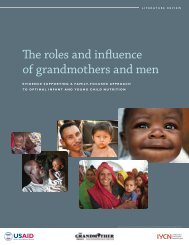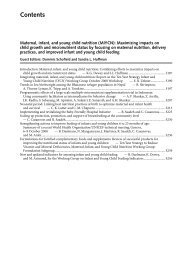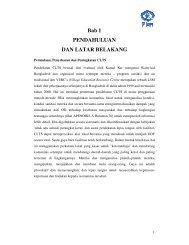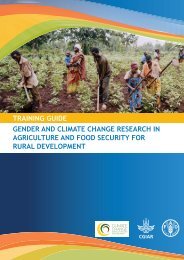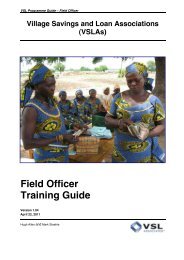Module 2. Theorethical Concepts of Gender - FSN Network Portal
Module 2. Theorethical Concepts of Gender - FSN Network Portal
Module 2. Theorethical Concepts of Gender - FSN Network Portal
You also want an ePaper? Increase the reach of your titles
YUMPU automatically turns print PDFs into web optimized ePapers that Google loves.
Mainstreaming <strong>Gender</strong> into Water, Sanitation and Hygiene (WASH) Programs<br />
<strong>Module</strong> 2: Theoretical <strong>Concepts</strong> <strong>of</strong> <strong>Gender</strong><br />
Lesson 5: Social and <strong>Gender</strong> Analysis<br />
1 New-Born Baby: ‘Birth’<br />
Training Materials 5.<strong>2.</strong>1<br />
Subject Matter <strong>of</strong> Role Plays<br />
Every newly-married couple dreams <strong>of</strong> a sweet, bright baby! This is also the<br />
cherished dream <strong>of</strong> all the other members <strong>of</strong> the family. One day, the waiting<br />
is over and the baby is born.<br />
• If the newborn baby is a girl, what is the reaction <strong>of</strong> the members <strong>of</strong> the<br />
family?<br />
• If the baby is a boy, how do the members <strong>of</strong> the family react?<br />
2 Childhood (1-5 years): ‘Distribution <strong>of</strong> toys’<br />
At this stage the baby learns how to walk and talk. The baby starts to<br />
recognise gradually the people and the things around him/her. The process <strong>of</strong><br />
the child’s personality development begins. Every day, he/she is exposed to<br />
new experiences. Raising a child is an intensive job and in the process he/she<br />
is presented with attractive toys.<br />
• What types <strong>of</strong> toys are usually given to the child if he is a boy?<br />
• What types <strong>of</strong> toys are usually given to the child if she is a girl?<br />
3 Childhood (6-11 Years): ‘Grooming for work’<br />
At this age the child is engaged in education and games, along with limited<br />
household task and responsibilities. These are mostly done with the<br />
cooperation <strong>of</strong> the parents.<br />
• What are the duties and responsibilities <strong>of</strong> girls in the household?<br />
• What are the duties and responsibilities <strong>of</strong> boys in the household?<br />
4 Adolescence (12-21 Years): ‘Family decisions regarding<br />
marriage’<br />
The parents are worried about the lives and careers <strong>of</strong> young boys and girls.<br />
Many decisions are made which influence the future <strong>of</strong> the adolescent. One <strong>of</strong><br />
the considerations is marriage.<br />
• What are the thoughts and decisions <strong>of</strong> the family in the case <strong>of</strong> boys?<br />
Is the marriage <strong>of</strong> boys considered at this age?<br />
• What are the thoughts and decisions <strong>of</strong> the family in the case <strong>of</strong> girls?<br />
What do the family and the society expect <strong>of</strong> girls when they reach 16-<br />
18 years?<br />
5 Adulthood (22 years and above): ‘Expression <strong>of</strong> opinion<br />
and decision making in the family’<br />
This is the time for family/conjugal life. Both women and men contribute to<br />
family life.<br />
• What is the role <strong>of</strong> women and men in family matters in terms <strong>of</strong><br />
freedom <strong>of</strong> expression, opinions, likes, dislikes and decision making?<br />
• Discuss any problems encountered in the family and demonstrate<br />
through role play who matters in the decision-making process.<br />
A Training Manual for Water Pr<strong>of</strong>essionals developed collaboratively by PROTOS and SNV, 01/02/2007<br />
<strong>2.</strong>11



